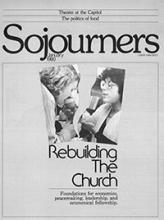In the early themes of the Old Testament and the experience of the New Testament church, it is clear that to be the people of God means to have certain forms of economic responsibility for each other and for the poor.
The Old Testament law and prophets give substantial attention to economic responsibility within the people of God and toward the sojourners and aliens with whom the people of God become "neighbors." Social injustice is seen as springing from economic injustice.
Judges were to give the poor full protection: "You shall not pervert the justice due to your poor" (Exodus 23:6). Interest was not to be exacted from the poor: "If you lend money to any of my people with you who is poor, you shall not be to him as a creditor, and you shall not exact interest from him" (Exodus 22:25). The poor were to be allowed to glean in the fields and vineyards: "You shall not reap your field to its very border, nor shall you gather the gleanings after your harvest; you shall leave them for the poor and for the stranger" (Leviticus 23:22). Every three years the yearly tithe was to be turned over to the poor and needy (Deuteronomy 14:28-29ff). Every 50 years debts were to be canceled, land was to be redistributed according to the original family holdings, and slaves were to be freed (Leviticus 25:8-12).
In essence, major reshufflings of the economy were to occur regularly so that all people had a new opportunity for economic security. Between such reshufflings, several ameliorative measures were instituted to soften the hardship of the poor.
Read the Full Article

